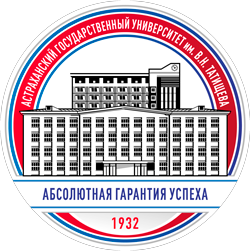Description of the project The strategic project aims to achieve knowledge-intensive results that influence the strategic policies of educational and research organisations in the Caspian macroregion working with the partners of the agro-industrial complex (AIC) in the field of science, innovation and education. The project consists of 5 interrelated pools: innovations in crop production, animal husbandry, aquaculture, deep processing of agricultural products, agricultural digitalisation and staff training for the AIC (a detailed description is set out in the Appendix to the section).
Purpose of the strategic project Ensuring food and technological security in the Russian part of the Caspian Sea region with preservation and mobilisation of the world’s genetic resources in crop production, animal husbandry and aquaculture in an arid climate.
Objectives of the strategic project
Creation of high-yielding varieties of agricultural crops with given technological parameters and development of innovative technologies for their cultivation based on the biologization and greening of arid agriculture;
Obtaining of the adaptive to the arid areas and productive potential farm animals, consistent improvement in the economic performance of the breeding heads of cattle, sheep, goats, horses and camels through the introduction of the latest genetic technologies;
Development and implementation of modern technological approaches to the creation of innovative agricultural food products based on the effective use of natural and climatic conditions and environmentally friendly raw material resources of the Russian part of the Caspian Sea region;
Development of alternative and low-cost sources of protein components for aqua feed, taking into account the regional raw material base; creation of new generation algicides to suppress the development of microalgae and cyanobacteria causing toxic water blooms; creation of integrated biological supplements based on aquatic macrophytes and microalgae in feeds to reduce aquatic organism disease development, using physico-chemical and genetic methods for aquaculture product quality assessment;
Creation and implementation of digital solutions, including the use of robotics and artificial intelligence systems to identify problem areas in agricultural fields and greenhouses;
The staffing requirements of key employers in the agro-industrial complex of the economies in the Russian part of the Caspian Sea region.
Expected results of the strategic project
The project will help to achieve knowledge-intensive results that will influence the strategic policy of educational and research organisations in the Caspian macroregion, working with industrial partners in the AIC.
The results of research on improving the productive and breeding qualities of farm animals using the latest advances in molecular biology and genetics will make it possible to obtain highly productive farm animals adapted to arid climate conditions that will increase the productivity of farms in the Russian part of the Caspian Sea region by 12.5%. Creation of the innovative agricultural products based on the use of environmentally safe raw material will increase import substitution by 2.5-5% in the region.
Experimental studies on adaptation of cotton plant from different cotton-growing countries to create a collection of donors and to select high-yielding varieties will allow to obtain new high-yielding cotton varieties with technological parameters that meet the requirements of modern agricultural production, which will allow to occupy 8.6% of the world cotton production market.
The creation and zoning of new high-yielding varieties of perennial fruit and berry plantations adapted to climate conditions will save the region up to 1.2 billion rubles per year on the purchase of non-released planting material.
The development of new varieties of vegetable crops with high consumer qualities for industrial vegetable production for fresh and processed use will reduce imports in this segment by 15-20% by 2030.
The introduction of complex fish farming approaches using technological elements of hydro- and aquaponics will reduce the cost of commercial production of hydrobionts by 24.5%, and ecological approaches in the cultivation of hydrobionts for organic aquaculture will make it more attractive to consumers. The project will ensure the bio-independence of the region and the Russian part of the Caspian Sea region and contribute to achieving the goal of accelerated development of genetic technologies.
According to the atlas of new professions, by 2030 ASU will have implemented programs and profiles of training and retraining of the AIC staff such as “Agricultural dietitian”, “Developer of the AIC digital models”, “Agricultural ecologist” with a total number of 900 students, or 17% of the total enrollment in all the enlarged groups of AIC training areas.
Development of infrastructure of laboratories, experimental sites, centres of collective use for projects of agriculture and aquaculture will provide annually at least 5 interdisciplinary research, with involvement in research project activities at least 60% of students per year; at least 10 students passed Ph.D. and doctoral dissertations defense; at least 5 scientific publications per year, included in Scopus and Web of Science journals; increase in publication activity of the university teaching staff by 25%.
The project in the field of innovation is focused on patent umbrella expansion, which will provide an increase in replication and scaling of developed technologies in the field of crop production by 11% and by 5.5% in the field of animal husbandry and aquaculture, getting income of the amount of 200 000 rubles per year from implementation of the intellectual property.
